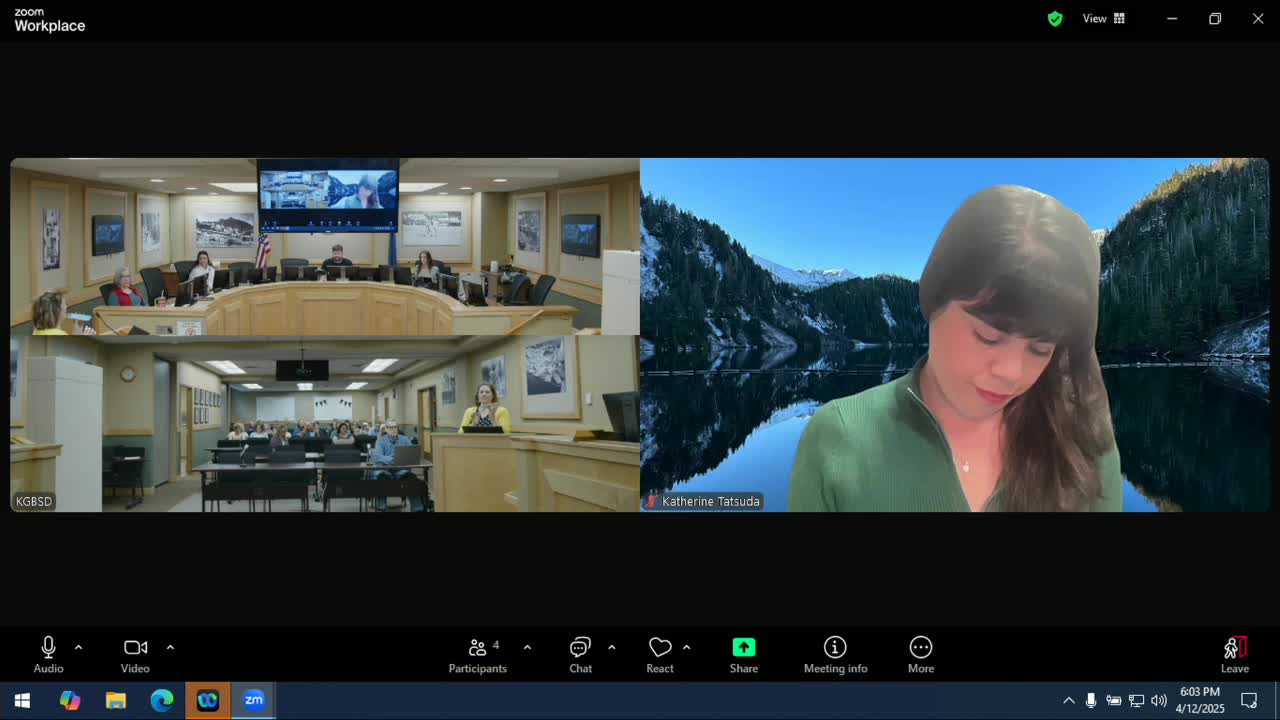Ketchikan school board rejects motion to revoke specialization; vote fails 4-1
Get AI-powered insights, summaries, and transcripts
Subscribe
Summary
After hours of public comment on proposed elementary restructuring, the Ketchikan Gateway Borough School District board voted 4–1 to reject a motion to revoke the previously approved specialization plan and adopt a multi‑age instruction cost‑saving model for 2025–26.
The Ketchikan Gateway Borough School District Board of Education on Saturday rejected a motion to rescind the district's elementary-school specialization plan and replace it with a multi‑age instruction cost‑saving model for the 2025–26 school year. Board member Ally Ginter moved the motion; the vote was 1 in favor and 4 against (Guenter yes; Hewitt no; Tabb no; Guthrie no; Tatsuta no). The motion failed.
The item came after nearly three hours of public comment, where dozens of parents, teachers, staff and students urged different outcomes. Speakers focused on competing priorities: preserving neighborhood schools and minimizing student transitions (arguments in favor of multi‑age), versus protecting elective courses, CTE (career and technical education) offerings and administrative capacity (arguments in favor of maintaining specialization). Camille McRoberts, a parent and former culinary instructor, said, "We're cutting away futures," warning that cuts to CTE and electives remove opportunities that keep students engaged.
Why it mattered: the board has been seeking ways to close a budget gap without closing a school. Proponents of multi‑age instruction argued it would save money while keeping neighborhood schools intact and reducing student transitions; opponents said the plan would eliminate key staff and programs — including librarians, music teachers and some paraprofessionals — and would increase burdens on administrators and special‑education services. Several speakers said specialization better preserves CTE and secondary elective programs that are difficult to restore once cut.
Public comment highlighted specific concerns and figures. Multiple speakers said the district identifies roughly 450–451 students receiving special‑education services; Debbie Olsen, special education coordinator, testified that those students require at least one annual meeting involving a principal or district representative, a general educator and a special‑education teacher or therapist. Matthew Boyd, a fourth‑grade teacher, said the latest RISE team data showed fourth through sixth grades have the most social‑emotional contacts and cautioned that grouping older elementary grades away from younger students could reduce peer supports for an "estimated 331" upper‑elementary students. Several speakers said the specialization plan, as previously adopted, would eliminate about 12 paraprofessional positions (some noted additional recent eliminations in drafts) and other staff.
Contracted services and funding were raised repeatedly. A speech‑language pathologist on staff said the district had spent about $500,000 on contracted teletherapy and related services in the current year, not counting paraprofessional costs required to facilitate those sessions. Camille McRoberts told the board her culinary program receives roughly $1,200 per year from the district and relies on Perkins grant funding for supplies. Mary Miller, a CTE teacher, reviewed federal support that typically funds CTE programs (Smith‑Hughes/Carl Perkins history and the current Perkins V program) and said cutting specialist positions jeopardizes those programs and grant funding streams.
Board discussion emphasized competing tradeoffs. Ally Ginter, who moved the revocation and adoption of the multi‑age model, argued that multi‑age classrooms "prioritize relationships over restructuring" and allow teachers to loop with students for multiple years, providing continuity for students with behavioral and trauma‑related needs. Other board members said specialization offers administrative and curricular benefits and can better protect some secondary programs and electives from cuts. Several trustees also cited uncertainty about future funding from the borough and the state; one trustee said changes in the borough's cash contribution reduce the district's flexibility.
No formal direction to staff or further votes on implementation followed the failed motion. Board members and many public commenters said the work would continue: the board will return to its regular meeting schedule and to budget hearings later in April, and trustees urged further community engagement and implementation planning regardless of which model is chosen.
The vote ends this specific motion but not the broader budget process. The board noted it will proceed with budget readings on April 23 and April 30 and that further decisions, including superintendent search and future staffing and program adjustments, will be considered at upcoming meetings.
Ending note: The meeting featured extended public testimony from teachers, parents and students representing Point Higgins, Houghton, Fawn Mountain, Ketchikan High and other district schools. Speakers repeatedly emphasized two themes: keeping neighborhood schools and minimizing student transitions, and preserving electives, CTE and special‑education staffing that supporters said are hard to restore after cuts.
